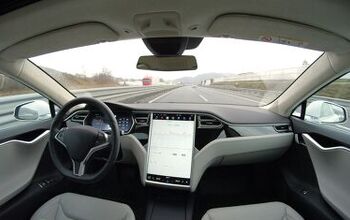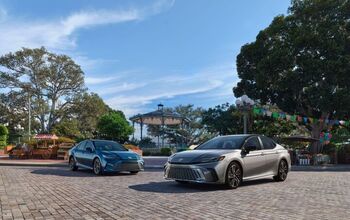Hyundai N Models to Receive Carbon Fiber Wheels

The UK-based wheel specialist from Dymag and composites wizards from Korea's Hankuk Carbon have announced the development of a line of hybrid carbon-fiber wheels for Hyundai’s N cars.
A prototype of the new N Performance carbon hybrid wheels were showcased at the Hyundai stand at this year’s Goodwood Festival of Speed alongside the spicy and all-electric Ioniq 5 N. Based on statements from Dymag, it may be the first model to receive them.
While the world can continue to debate whether Korean automakers have matched Japanese brands in terms of overall reliability, any discussions about performance are over. Hyundai and Kia have been offering some of the most entertaining vehicles in their respective segments and it’s starting to become embarrassing for the rest of the industry.
Hyundai’s high performance N models are consistently excellent and frequently go the extra mile to cater to driving enthusiasts. The brand always seems willing to push the envelope. Adding carbon fiber wheels are a continuation of that theme, as they were formerly exclusive to super cars regular people couldn’t possibly afford. Though it’s hard to say if this is the best place to spend money if you’re trying to maximize your performance dollars. While Dymag and Hyundai have been cagey on the details, these wheels will almost assuredly be optional extras and likely relatively expensive vs a set of alloys.
However, they probably won’t be as expensive as what you can option on something like the Chevrolet Corvette. This is because Dymag’s design consists of a composite outer rim and a forged metal center. While it probably won’t help to avoid any cursing when you inevitably curb them, the design should make a set cost a few thousand dollars less than wheels that were made entirely of carbon fiber.
The N Performance hybrid wheels are supposed to offer 40-50 percent weight savings against a traditional cast aluminum wheel. This is handy for reducing unsprung mass and rolling inertia. However the UK-based company said the units also improve overall stiffness and strength. Under extremely high loads the outer rim will flex, rather than deform like aluminum might. Harmonic characteristics of carbon fiber are likewise supposed to help reduce noise, vibration, and harshness.
Dyman announced its partnership with Hankuk Carbon in May, stating their intention to build lightweight composite wheels at scale. Lowering manufacturing costs was a key component of the joint program. But few were under the impression that Hyundai would be their first customer.
“The price-point for these wheels will be appropriate for both luxury and performance-oriented versions of road cars, particularly the growing high-end electric vehicle market, thanks to Dymag’s technology benefits in improving EV range and NVH,” Dymag CEO Tom de Lange stated in an earlier release. “For all automotive sectors, the dynamic, durability and aesthetic benefits of carbon composite hybrid wheels will become accessible to a larger number of consumers through OEM programmes [sic].”
The company has since said it’s in advanced development stages with multiple automakers, with further original equipment supply agreements set to be announced in the near future.
“This is the start of what we hope is a long and fruitful relationship with Hyundai, which will bring our game-changing technology to a wider audience of global automotive customers,” said de Lange. “Carbon hybrid wheels from Dymag bring many benefits for high-performance vehicles, with very low capital expenditure for car makers thanks to our patented technology and lean production methods. We look forward to announcing further OEM agreements very soon.”
Full specifications of the wheels will be made available in the coming months.
[Image: Hyundai]
Become a TTAC insider. Get the latest news, features, TTAC takes, and everything else that gets to the truth about cars first by subscribing to our newsletter.
[Images: Dymag]

A staunch consumer advocate tracking industry trends and regulation. Before joining TTAC, Matt spent a decade working for marketing and research firms based in NYC. Clients included several of the world’s largest automakers, global tire brands, and aftermarket part suppliers. Dissatisfied with the corporate world and resentful of having to wear suits everyday, he pivoted to writing about cars. Since then, that man has become an ardent supporter of the right-to-repair movement, been interviewed on the auto industry by national radio broadcasts, driven more rental cars than anyone ever should, participated in amateur rallying events, and received the requisite minimum training as sanctioned by the SCCA. Handy with a wrench, Matt grew up surrounded by Detroit auto workers and managed to get a pizza delivery job before he was legally eligible. He later found himself driving box trucks through Manhattan, guaranteeing future sympathy for actual truckers. He continues to conduct research pertaining to the automotive sector as an independent contractor and has since moved back to his native Michigan, closer to where the cars are born. A contrarian, Matt claims to prefer understeer — stating that front and all-wheel drive vehicles cater best to his driving style.
More by Matt Posky
Latest Car Reviews
Read moreLatest Product Reviews
Read moreRecent Comments
- 3-On-The-Tree Tassos, I’m have several different responses yeti your question.[list=1][*] I didn’t buy the corvette for the sole purpose of highway travail, I got it because my dad had a 57 Corvette with 2 four barrel carbs and. 283 V8. I wanted a corvette and a friend who has a custom car performance shop said to get the newest one you could afford.[/*][*]. Letting a car sit is the worst thing for it so it was my daily driver when I was still in the army 30 miles to the base round trip, 160 miles to Tucson form my doctors appointments and VA stuff. My POS 2014 F150 was constantly in the shop for both turbos, two rear main seals, timing chain, transmission. So I was in the process of selling that.[/*][*]But the most important point is that everyone has an opinion and it doesn’t matter what car a person buys or what they use it for.[/*][/list=1]
- EBFlex About time the corpse does something right.I wonder where he got the idea....
- Ajla And in case anyone was interested, yes this tariff does also apply to Polestars, Lincolns, Teslas, Buicks, etc.
- SCE to AUX NPR had an interesting piece on this situation just yesterday, and it turns out that Biden has actually expanded the Trump China tariffs rather than roll them back.However, rather than using the usual shotgun approach employed by past Presidents, Biden's tariff hikes are directed at green/clean energy items which also include non-automotive things such as solar panels.So it looks like the IRA's selective anti-China incentives are part of a larger green agenda, but the plan could backfire if consumers simply choose non-green products instead.Not to mention that it takes gobs of tax money to create the jobs our leaders promise. One calculation put the cost of each new US job created in the solar panel industry at $800k (grain of salt here).Historically, tariffs have been applied after elections, as a reward to those who supported the winning candidate. Of course, this one is happening before the election. Both have political timing, but their economic benefit is doubtful at best, usually injuring the nation who imposes the tariffs.The EU is also getting in on the act, so we could be facing an economic world war over the sourcing of green products. Sadly, if China wasn't an oppressive communist state, we wouldn't even be having this discussion.
- BlackEldo My initial reaction to the interior was "well, they have to leave something on the table to sell the equivalent-sized Lexus." Then I saw the MSRP...


































Comments
Join the conversation
This isn't so much a "CF wheel" as a 2-piece wheel with a CF barrel. Still nice for mass reduction, but comparing it to a cast aluminum wheel is a bit of putting a thumb on the scale. Lemme know how it compares to a lightweight forged wheel of the same size.
2nd that! if the price difference is high enough folks will just go with the forged route instead .
(does anyone have any idea how CF does in the winter? i'm just thinking not so good so this would def just be a summer wheel IMHO)